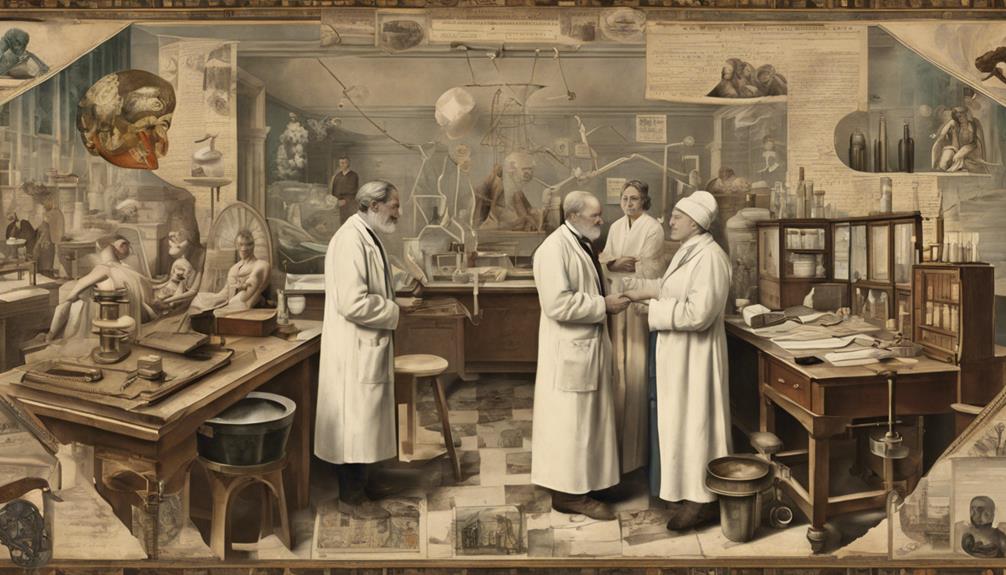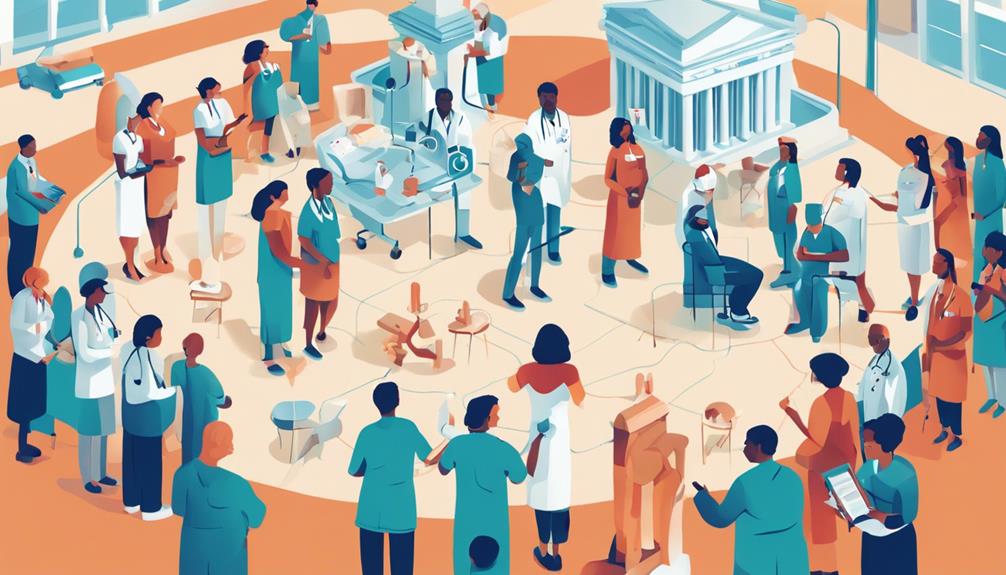Healthcare comes from a blend of ancient wisdom and modern advancements. You'll find its roots in ancient civilizations that combined natural remedies and spiritual practices. Over time, this evolved into traditional healing methods that addressed body, mind, and spirit. Today, modern medicine emphasizes evidence-based practices, breakthroughs like vaccines, and the latest technology such as telemedicine. Influential figures like Hippocrates and Florence Nightingale shaped ethical standards and care approaches. Governments play a significant role in funding and regulations to guarantee access and quality. As you explore further, you'll uncover more on how these elements interact to form the healthcare system we understand today.
Ancient Beginnings of Medicine

Medicine's roots stretch back to ancient civilizations, where early healers combined natural remedies with spiritual practices to address ailments. You'll find that herbal remedies were central to these early healing methods. Plants like willow bark, which contains salicylic acid, were used for pain relief long before modern pharmaceuticals emerged. Healers often relied on their knowledge of local flora, creating tinctures and poultices that laid the groundwork for today's herbal medicine.How Many Health Insurers Are There in the Us
In addition to herbal remedies, ancient surgeries played a critical role in the evolution of healthcare. Civilizations such as the Egyptians and Greeks performed procedures that included trepanation—an early method of drilling holes into the skull to treat head injuries or mental disorders. These surgeries, though rudimentary by today's standards, demonstrated a remarkable comprehension of anatomy and surgical techniques for their time.
As you explore these ancient practices, it's clear that the quest for healing has always been a blend of observation, experimentation, and cultural beliefs. This fusion of herbal remedies and surgical interventions marked the beginning of a long journey toward modern medicine, shaping how we perceive health and illness today.
Traditional Healing Practices
Traditional healing practices have been passed down through generations, blending cultural beliefs with natural remedies to address health and wellness. You'll find that many cultures rely on herbal remedies, utilizing plants and herbs to treat various ailments. These remedies can range from simple teas to complex tinctures, each with unique properties aimed at promoting healing.
In addition to physical treatments, spiritual healing plays a vital role in traditional practices. Many believe that emotional and spiritual well-being directly influences physical health. Techniques such as meditation, prayer, or rituals help restore balance and harmony within the individual. When you engage in these practices, you often find a deeper connection to your culture and community.
Traditional healers, often regarded as community leaders, possess extensive knowledge of local plants and spiritual practices. They diagnose and treat based on a holistic understanding of the person, not just the symptoms. By integrating herbal remedies and spiritual healing, these practices offer a thorough approach to health that has stood the test of time.
Embracing these traditions can enrich your perspective on health, emphasizing the interconnectedness of body, mind, and spirit.
The Rise of Modern Medicine

As societies evolved, the need for more systematic and scientific approaches to health led to the rise of modern medicine, which emphasizes evidence-based practices and advanced technology. You might notice that this shift has brought numerous medical breakthroughs, transforming how we diagnose and treat diseases. Innovations like antibiotics, vaccines, and advanced imaging techniques have greatly improved patient outcomes and extended life expectancy.
Modern medicine doesn't just focus on treating symptoms; it also recognizes the importance of holistic approaches. By considering the physical, emotional, and social aspects of health, healthcare providers aim to treat the whole person rather than just the illness. This thorough view encourages preventative care and promotes healthier lifestyles, which can ultimately reduce the burden of disease.
Moreover, as you engage with modern healthcare systems, you'll encounter the integration of technology, such as telemedicine and electronic health records, enhancing accessibility and efficiency. These tools facilitate better communication between patients and providers, ensuring everyone stays informed.
Influential Figures in Healthcare
Throughout history, influential figures have shaped the landscape of healthcare, driving innovations and advocating for patient rights.
One of the most notable is Florence Nightingale, often referred to as the founder of modern nursing. Her work during the Crimean War not only improved sanitary conditions but also established nursing as a respected profession. Nightingale's emphasis on data collection and statistics paved the way for evidence-based practices in medicine.
Another key figure is Hippocrates, known as the 'Father of Medicine.' His contributions laid the foundation for a systematic approach to diagnosis and treatment. Hippocrates introduced the Hippocratic Oath, which emphasizes ethical practice and patient confidentiality. This oath remains relevant in medical training today.
Both Nightingale and Hippocrates exemplify how passionate individuals can transform healthcare systems. They focused on improving patient care, fostering a culture of respect and integrity.
Their legacies continue to inspire healthcare professionals to prioritize patient welfare and uphold high standards in medical practice. By understanding the impact of these figures, you can appreciate the evolution of healthcare and the ongoing commitment to quality care.
Government's Role in Healthcare

Government plays an essential role in shaping healthcare systems by establishing regulations, funding initiatives, and guaranteeing access to services for all citizens. Through healthcare policy, the government addresses public health challenges, implementing funding mechanisms that support critical programs. These initiatives help improve insurance coverage, making necessary care more affordable and accessible.
Regulatory frameworks guarantee that healthcare providers meet quality standards, protecting patients and enhancing trust in the system. Government intervention is key for addressing social determinants of health, which influence individuals' well-being. By advocating for access equity, the government works to eliminate disparities in healthcare, guaranteeing that everyone receives preventive care and necessary treatment.
In response to evolving needs, health system reforms often emerge to improve efficiency and effectiveness. These reforms aim to create a sustainable healthcare landscape that can adapt to changing demographics and health trends. By prioritizing preventive care and early intervention, government efforts can lead to healthier populations and reduced long-term costs.
Ultimately, the government's role in healthcare is essential for fostering a system that prioritizes the health of all citizens, guaranteeing thorough access and promoting overall public well-being.
Impact of Technology on Care
Technology is transforming healthcare in ways you mightn't expect.
With advancements in telemedicine, you can now consult with doctors from the comfort of your home.
Additionally, wearable health devices are empowering you to monitor your health in real-time, making care more proactive than ever.
Telemedicine Advancements
Telemedicine has transformed the way you access healthcare, making it more convenient and efficient than ever before. With just a few clicks, you can schedule virtual consultations with healthcare providers from the comfort of your home. This flexibility saves you time and reduces the stress of traveling to appointments, especially when you're feeling unwell.
Remote monitoring is another key advancement in telemedicine. It allows healthcare professionals to keep track of your health from afar. Using various digital tools, they can monitor essential signs and symptoms in real-time, providing timely interventions when necessary. This proactive approach can greatly enhance your overall health and well-being.
Moreover, telemedicine has expanded access to specialists who mightn't be available in your local area. You can now consult with experts without the constraints of distance or mobility. This accessibility is especially beneficial for those in rural or underserved regions.
Wearable Health Devices
As telemedicine enhances your healthcare experience, wearable health devices are stepping in to further empower you with real-time insights into your health. These devices, such as smartwatches and fitness trackers, enable you to monitor essential signs, activity levels, and sleep patterns with ease. By collecting data on your daily habits, they're not just gadgets; they serve as personal health companions.
With fitness tracking capabilities, you can set and achieve goals that promote a healthier lifestyle. Whether you're walking, running, or cycling, these devices help you stay accountable and motivated. They provide valuable health analytics, allowing you to visualize trends in your fitness journey.
Moreover, many wearable health devices can sync with telemedicine platforms, giving healthcare providers direct access to your health metrics. This seamless integration allows for more personalized care and timely interventions when necessary.
Ultimately, wearable health devices put you in control of your health. By harnessing technology, you can make informed decisions and proactively manage your well-being, ensuring a more connected and effective healthcare experience.
Future Trends in Healthcare

The future of healthcare is poised to transform dramatically, driven by innovations that prioritize patient-centered care and personalized treatment options. You can expect a growing emphasis on personalized medicine, where treatments are tailored to your unique genetic makeup and lifestyle. This approach not only enhances treatment effectiveness but also minimizes adverse effects, allowing you to receive care that truly meets your needs.
Moreover, advancements in technology aim to improve healthcare accessibility. Telemedicine is becoming more prevalent, enabling you to consult with healthcare professionals from the comfort of your home. This means you can access specialists and receive care without the barriers of distance or mobility, making healthcare more equitable for everyone.
Artificial intelligence (AI) is another game-changer. By analyzing vast amounts of data, AI can help identify patterns, predict health issues, and streamline administrative processes, ultimately improving patient outcomes.
As these trends unfold, you'll see a shift towards a healthcare system that's not only more efficient but also more focused on you—the patient. Embracing these changes will empower you to take charge of your health in ways previously unimaginable.
Conclusion
In understanding where healthcare comes from, you see a rich tapestry woven from ancient practices to modern advancements.
Traditional healing laid the groundwork, while influential figures and government roles shaped its evolution.
Today, technology continues to transform how care is delivered.
As you look ahead, staying informed about future trends will empower you to navigate this ever-changing landscape.
Knowing the origins of healthcare helps you appreciate its complexity and the ongoing efforts to improve it for everyone.
